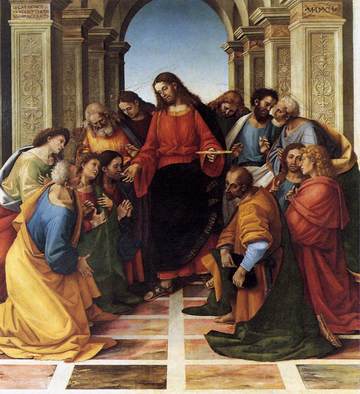Reading the Signs
Tuesday of the Sixth Week of the Year I
Mark 8:14–21

Unintelligence
My French Bible subtitles today’s passage from Saint Mark: “The Unintelligence of the Disciples.” This does not suggest that the disciples were feebleminded; it means, rather, that they were incapable of reading the signs given by Jesus. The word “intelligent” derives from legere, to read, and intus within or inside. The disciples witnessed the multiplication of the loaves in a desert place. They saw Our Lord feed four thousand men and, with their own hands, distributed the miraculous bread to the people. They counted seven baskets left over. And still, the meaning of the sign escaped them. They were unintelligent: incapable of reading inside the meaning of the event.
Except for One Bread Only
We saw yesterday that the Pharisees, blind to the meaning of the multiplication of the loaves, asked Jesus for a sign from heaven. He sighed from the depths of his heart and left them. Today, we see Our Lord in the boat with his disciples. Listen carefully to what Saint Mark says, following the Greek and Latin texts closely: “Now they had forgotten to bring breads; and except for one bread only, they had none with them in the boat” (Mk 8:14).
The Bread of Life
By translating the second “bread” in the sentence as “loaf,” the American lectionary misses the point entirely. Both the Greek text and the Latin typical edition of the lectionary use the same word twice. “They had forgotten to bring bread (plural); and except for one bread only, they had none with them in the boat” (Mk 8:14). The “one bread” with the disciples in the boat is none other than Jesus himself. “I am the bread of life” (Jn 6:35). “I am the living bread which came down from heaven; if anyone eats of this bread, he will live forever; and the bread which I shall give for the life of the world is my flesh” (Jn 6:51). This is the unintelligence of the disciples: the one Bread necessary, the Bread of Life, is in the boat with them, and they fail to recognize him.
Discerning the Body of the Lord
Saint Paul warns us against a similar unintelligence, a lack of discernment when it comes to the adorable mystery of the Eucharist. “Let a man examine himself, and so eat of the bread and drink of the cup. For anyone who eats and drinks without discerning the body eats and drinks judgment upon himself. That is why many of you are weak and ill, and some have died” (1 Cor 11:27-30). The boat is the Church; the one Bread is the Body of Christ. Those in the boat must discern the presence among them of the living Bread come down from heaven. Those who fail to do so are already infected with “the leaven of the Pharisees and the leaven of Herod” (Mk 8:15).
The Inflation of Sin
What exactly is this leaven? For the rabbis, leaven was a symbol of the evil hidden within the human heart. Slowly, and in a way surprisingly disproportionate to its size, it spreads its corruption until the inflation of sin becomes manifest. In the context of today’s Gospel the leaven is the lack of faith and willful blindness of the Pharisees and of Herod. The disciples are at risk; they too could be influenced by the corrupting doubts at work in those around them. Anyone with experience of community or family life knows well that certain types of leaven can put everyone at risk. The murmuring condemned by Saint Benedict is the first sign of a leaven rising in the heart, inflating one with pride and sowing trouble in the hearts of others.
Eucharistic Faith Renewed
The leaven of unintelligence and doubt can be counteracted by a lively faith: faith, above all, in the mystery of the Eucharist. The Missal gives, in preparation for Holy Mass, a marvelous series of prayers ascribed to Saint Ambrose. We do well, from time to time at least, to pray them for the strengthening of our faith and for purification from every corrupting leaven, lest we fall into unintelligence of the Mystery.
I know and truly believe with my whole heart,
and with my lips proclaim,
that you can make me worthy,
you alone have power to make clean the offspring of uncleanness,
to make from sinners those who are just and holy.
By this almighty power, I pray you grant that,
I may offer this sacrifice with reverence and awe,
with purity of heart and with flowing tears,
with spiritual joy, and with heavenly gladness.
Let my soul feel the delight of your blessed presence,
and the watchfulness of your holy angels round about me.
(Preparation for Holy Mass, Tuesday)
